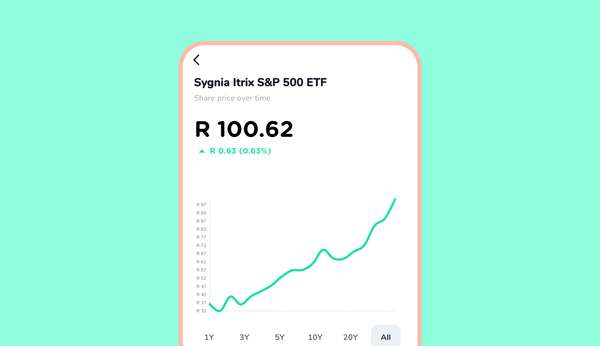At Franc we emphasise over and over again that saving is not enough – you must invest your savings. Saving is about ‘paying yourself first’, putting some of your money aside to pay for big expenses in the future, for emergencies, and ultimately for when you stop working. But ‘savings’ – money kept in savings accounts (or worse, in a box under the bed) – actually decrease in value over time. There are exceptions, but most savings accounts pay a rate of interest that is less than the inflation rate.
📖 Learn about inflation and inflation rates on Franc Academy
If your money is in an ordinary savings account, prices are going up more each month than you are earning in interest. Saving without investing is like paddling upstream in a river with a strong current. Even though you keep paddling, the water gradually pushes you backwards. What can you do to ensure that your money grows faster than prices are rising? The answer: invest your money.
But there are so many different ways to invest your money. Here, in our opinion, are the best types of investments in South Africa.
1. Tax-Free Savings Accounts
💡 What is it? The first ‘investment’ on our list is not actually an investment in itself, but a type of account. Tax-free savings accounts (TFSA) are products enabled by the government that help people grow their savings by removing the tax costs associated with most investments.
The advantages of these accounts are so good that if you don’t yet have a TFSA, you should consider opening one.
As soon as you’ve saved enough to go over the tax exemptions, tax starts to erode your investment growth. Tax on interest, tax on dividends, tax on capital gains – all of these taxes will eat away your money.
But you don’t pay any of these taxes if you invest via a TFSA. And depending on which type of TFSA you open, you can choose any of the investment options below and maximise growth by not paying tax.
📖 Read more about tax-free savings accounts
2. Money Market Funds
💡 What is it? A money market fund is a type of unit trust that gives ordinary investors access to institutional money markets, where money market fund managers typically trade short-term instruments issued by banks, companies and government entities. When you invest in a money market fund, you’re effectively investing in cash.
Like an ordinary savings account, a money market fund (or unit trust), pays interest every month. Unlike savings accounts, the interest on these funds fluctuates with market conditions. Perhaps that’s why some people are wary of them.
Don’t let the variable interest rate scare you – the interest paid by money market funds is typically more than double the interest you will earn in an ordinary savings account.
For example, Capitec (which is better than most) is currently paying 4.5% on savings account balances, whereas most money market funds – like the Allan Gray Money Market Fund we offer to Franc members – are around 8% or better.
R10,000 invested for 10 years at 4.5% turns into more than R15,600. But at 8%, that same money turns into more than R21,600 – a significant difference. And 4.5% is less than the current inflation rate. So even though your money is growing, it’s not keeping up with rising prices. At 8%, your savings are growing in real terms.
📖Read more about long-term versus short-term investing
3. Fixed Deposits
💡 What is it? A fixed deposit is a form of savings account that pays you a higher rate of interest in return for locking you into a minimum term.
Like money market funds, fixed deposits pay interest that usually beats inflation.
Money market funds are your best choice if you want an almost completely risk-free investment that doesn’t ‘lock you in’ – money market funds allow you to withdraw your savings at any time.
Fixed deposits are a good option if you have some money that you are absolutely sure you won’t need in the near future. (And note that some fixed deposits nowadays offer one or two ‘free’ withdrawals if you have an emergency.)
As the name suggests, these investments are ‘fixed’ for a period ranging from 30 days to months or years – the longer you’re willing to invest for, the higher the interest rate. And it’s guaranteed.
Most banks are currently offering rates of 10.5% or better for periods of at least a year. And you’ll see higher rates offered, like African Bank’s 13.8%. But be careful, because this company has already gone bankrupt before.
4. Unit Trusts
💡 What is it? Unit trusts are ‘collective investments’ that pool investor money to give access to professionally managed funds at lower minimum entry amounts, and competitive fees.
There are several types of unit trusts, but our favourites are ‘tracker’ funds – also known as ‘passive funds’ or ‘index funds.’
By tracking an index such as the JSE Top 40 (the top 40 companies on the Johannesburg Stock Exchange), index funds offer diversification and the lowest costs. This often results in strong performance of your investments.
For example, the 1NVEST S&P 500 Info Tech Index Feeder Fund has delivered a return of almost 25% per year over the last 5 years. This is exceptional – and not the performance you should expect – but it shows why people invest some of their money in tracker unit trusts.
The disadvantage of unit trusts is that they are not risk-free. Returns are not guaranteed, and it is possible to lose money. You are not locked in, but to get the best results you have to stay invested for at least 3 years – and preferably 5 years or longer.
5. Exchange Traded Funds (ETFs)
💡 What is it? Exchange Traded Funds, or ETFs, are like unit trusts but are listed on the stock exchange. These are generally all tracker funds.
The Satrix Top 40 ETF, the fund Franc investors are accessing when they invest in equity, is a good example. It tracks the JSE Top 40 index and has delivered over 14% per year over the last 3 years.
Many management companies offer both ETFs and index-tracked unit trust funds (for example, 1INVEST also has a S&P 500 Info Tech Index Feeder ETF).
The returns on unit trust trackers and ETFs following the same index are very similar, and the decision as to which is better is purely about the type of account you have:
- Unit trusts can be bought directly from the management company. If you don’t want a stockbroking account, go for the unit trust equivalent.
- ETFs, on the other hand, are designed to be bought and sold on the stock exchange like shares. So if you have a stockbroking account, buy ETFs (or access an ETF via the Franc app).
6. A Stockbroking Account
💡 What is it? Again, not an investment product, but a way of accessing types of investment products. A stockbroking account gives you direct access to everything that is bought and sold on the stock exchange. Most also offer access to other, related instruments.
As your savings grow and you learn more about investing, a stockbroking account becomes a very real consideration.
An online stockbroking account is an extremely convenient way to buy and sell both funds (like ETFs) and individual shares. Most stockbroking accounts pay interest on cash that’s waiting to be invested, and withdrawing money is simple.
EasyEquities is a good example of a flexible, low-cost stockbroking account that really does make it easy to manage your investments.
In fact, the disadvantage of a stockbroking account is that it is almost too easy – too easy to sell, to change your mind, to sabotage your own best intentions.
Successful saving and investing is mostly about your behaviour. So a stockbroking account is only a good idea once you’re sure that your self-discipline around your investing habits will not be disrupted by market volatility. Many stockbroking accounts also charge high monthly fees so this also needs to be factored in.
📖Learn more about the stock exchange and share prices
What About Property, RAs and Whole Life Policies?
You may be wondering why we haven’t mentioned things like property, retirement annuities and investment-linked life insurance policies.
There are a few reasons, but the main one is that we prefer simple investments where you are in control of your money.
Direct investment in property is complex. Owning your own home is generally a good idea, but residential property has generally been a poor investment in South Africa. Over the last 10 years the FNB House Price Index has not kept up with inflation. And if you factor in the significant costs associated with buying, selling and maintenance, it becomes clear that home ownership should not be pursued for its investment potential.
A retirement annuity (RA) is not in itself an investment, it’s a type of product. With an RA you still have to choose the underlying investment vehicles – which could be, for example, an equity unit trust as described above.
Also, an RA is a tax-structured product with many restrictions. When it ‘matures’ at retirement age, you pay tax on most of proceeds for the rest of your life.
‘Whole Life Policies’ (investment-linked life insurance policies, which are sold by various names) are bad investments. They were designed by the life insurance industry to make life insurance look like a less painful expense. But that’s what it is – an expense. At Franc, we think you should keep your insurance and your investments separate.










